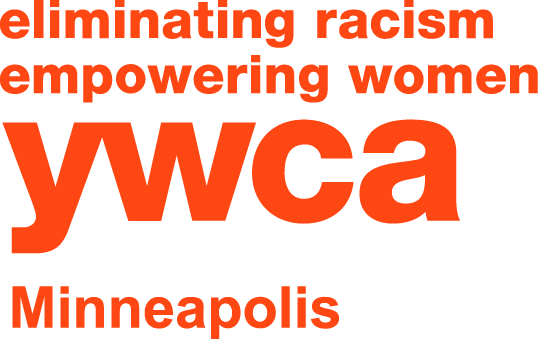Race Against Racism 2K/5K Goes Indoors!
The sun was shining on a bright February morning and the racers were at the starting line, ready to kick off our third annual Race Against Racism! Over 140 racers joined us in the Minneapolis Sports Center at YWCA Midtown for a 2K/5K race to raise awareness of the systemic racism that permeates our community and take steps toward equity and justice.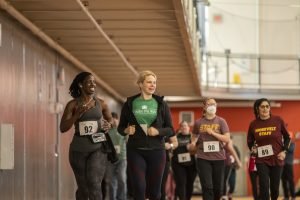
Connecting Fitness and Racial Justice
This event tied together the often disconnected values of fitness and racial justice. In our work, we recognize that movement can be a process for healing and change. While making their way along the track, participants and spectators learned more about racial justice through our many partners and educational opportunities. We moved our bodies, our hearts and our minds in the collective desire for a brighter, more equitable future.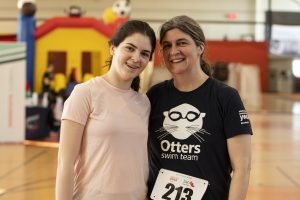 Mother and daughter, Diane and Eileen Mortimer, participated in the race. Eileen is involved with our Otters Youth Swim Team!
Mother and daughter, Diane and Eileen Mortimer, participated in the race. Eileen is involved with our Otters Youth Swim Team!

Cousins Andrea Reese and Darcie Big Bear
Andrea and Darcie stated,
"We are training to run the Ashland Marathon! Fitness and being healthy is a gift. We live right up the block by YWCA Midtown, and my youngest son does Strong Fast Fit!"
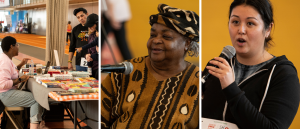 Black Garnet Books joined us with several racial justice books and resources for all ages. Storyteller Nothando Zulu shared stories of incredible bravery, resilience and faith. State Representative Samantha Sencer-Mura spoke about the triumphs at the state Capitol so far this session and the continued work yet to come as we work toward equity and justice in Minnesota.
Black Garnet Books joined us with several racial justice books and resources for all ages. Storyteller Nothando Zulu shared stories of incredible bravery, resilience and faith. State Representative Samantha Sencer-Mura spoke about the triumphs at the state Capitol so far this session and the continued work yet to come as we work toward equity and justice in Minnesota.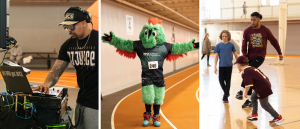 Our partners at the Minnesota Aurora FC and University of Minnesota Golden Gophers athletes provided activities for children and families as DJ JU!CE filled the sports center with high-energy music to get everyone moving! Many runners even got to run alongside Aurora's mascot, Rory the Aurorasaurus!
Our partners at the Minnesota Aurora FC and University of Minnesota Golden Gophers athletes provided activities for children and families as DJ JU!CE filled the sports center with high-energy music to get everyone moving! Many runners even got to run alongside Aurora's mascot, Rory the Aurorasaurus!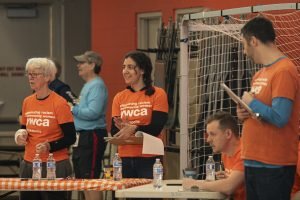 With the help of an incredible team of volunteers, this year’s Race Against Racism was a huge success. Thank you for joining us to bring this event to life. A 2K or 5K race cannot end racism. But naming the need is vital, and every step we take together makes a difference. We will keep running until injustice is rooted out, institutions are transformed, and the world sees people of color as we do: Equal, Powerful, Unstoppable.View the 2023 RAR photo album
With the help of an incredible team of volunteers, this year’s Race Against Racism was a huge success. Thank you for joining us to bring this event to life. A 2K or 5K race cannot end racism. But naming the need is vital, and every step we take together makes a difference. We will keep running until injustice is rooted out, institutions are transformed, and the world sees people of color as we do: Equal, Powerful, Unstoppable.View the 2023 RAR photo album
Resources to Continue Your Anti-Racism Journey
Anti-racism work is an endurance event, not a sprint, and requires ongoing learning and training. Continue below to review resources to support your anti-racism journey.
Statistics are from the Advancing Health Equity in Minnesota report, February 2014, Minnesota Department of Health; the privileges are adapted from Dr. Peggy McIntosh’s 1989 work, “Unpacking the Invisible Knapsack.”
Learn and Reflect
People experiencing the greatest health disparities experience the greatest inequities in social and economic conditions.
Minnesota poverty rates for children under 18:
- twice as high for Asian children
- three times as high for Hispanic/Latinx children
- four times as high for Native children
- nearly five times as high for African American children
Unemployment is highest among populations of color and people living in rural areas.
Minnesota Homeowners:
- 75% white
- 54% of Asian/Pacific Islanders
- 47% of Native
- 45% of Hispanic/Latinx
- 21% African Americans
African Americans and Hispanic/Latinx in Minnesota have less than half the per-capita income of the white population.
Native and African Americans are incarcerated nine times the rate of white persons.
Native, Hispanic/Latinx, and African American youth have the lowest rates of on-time high school graduation.
White Race, Ethnicity and Culture Privilege
Examples:
- I can expect that I’ll receive days off from work for holidays that matter to me.
- People know how to pronounce my name; I am never mocked or perceived as a threat because of my name.
- I know that the police and other state authorities are there to protect me.
- People of my race are widely represented in media, positively as well as negatively.
- When I am told about our national heritage or about “civilization,” I am shown that people of my color made it what it is.
- I do not often have to think about my race or ethnicity — in fact, I don’t really notice it.
- I do not have to worry about incarceration unless I commit a very serious crime.
- People do not assume that I am unintelligent or lazy based on my race.
- There have never been attempts to scientifically or socially eliminate people of my race or ethnicity.
- Other people attribute my successes to my personal merit.
- I do not have to worry about being chosen last for a job or housing due to my race or ethnicity.
- I can move into a new neighborhood, start a new job or enter a new school or class and know that the people around me will generally respect and feel safe around me.
- I can go to a store or spend money knowing that no one will be suspicious of me.
- I am seen as an individual; I am never held personally responsible for the actions of other people of my race or ethnicity.
Learn More About Racial Justice ProgramsDonate to YWCA Minneapolis
